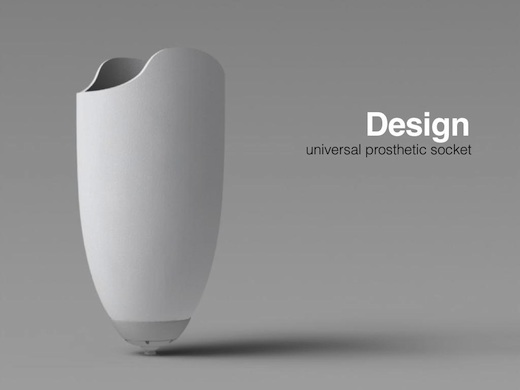A prosthetic socket designed to be adjustable, robust and affordable designed by Benevolent Technologies for Health (BETH) was named one of two international runner-ups for the prestigious James Dyson Award.
Product Design alumnus Jason Hill is part of the BETH Project team, which also includes Elizabeth Tsai, an MIT student pursuing her master of science degree, Ramin Abrishamian, an MIT alumnus and businessman, and Asa Hammond, who is earning a degree in physiological science at UCLA.
The BETH Project’s website says its launch product “will bring significant cost savings to the multi-million dollar prosthetic care industry that struggles to meet the needs of low income patients especially in developing countries.”
The team also says that by being made from an infinitely re-moldable material, its mass-producible socket device will cut prosthetic care costs by reducing or eliminating labor intensive procedures like fitting, fabrication, adjustment and re-fabrication.
 Hill says the idea for an adjustable prosthetic grew out of a hackathon at MIT called H@cking Medicine, which brought together doctors, engineers, designers and business people to take on health challenges. At the hackathon, the BETH team formed around the challenge of creating low-cost artificial limbs.
Hill says the idea for an adjustable prosthetic grew out of a hackathon at MIT called H@cking Medicine, which brought together doctors, engineers, designers and business people to take on health challenges. At the hackathon, the BETH team formed around the challenge of creating low-cost artificial limbs.
“We began by getting an understanding of the costs and challenges in delivering prosthetic care,” said Hill, who graduated in 2009 and also studied at INSEAD in Singapore through the the Colleges’ Business Design Exchange program. ”This led us to some astonishing statistics, such as according to the World Health Organization, there’s an estimated shortage of 40,000 prosthetists [prosthetics care providers], and at the current rate there will only be an additional 17,000 added by 2050.”
The team was also surprised to discover that the established resource- and labor-intensive approach to socket fitting and fabrication was developed shortly after WWII.
Hill explains that although there has been significant innovation in the design of prosthetics components, such as microprocessor knees and robotic ankles, socket fabrication is a casting, shaping and molding process that requires each care facility to have expensive machinery and technical staff.
Hill says the education he received at Art Center informed not only the design but also the research and business aspects of the BETH Project. “One of the most useful skills I acquired during my time at Art Center, being a cash-strapped student, was how to quickly and cheaply test and improve ideas,” said Hill.
“The most valuable design lesson at Art Center came from an Eva Zeisel quote that [instructor] Katherine Bennett shared with me: To design is to give a gift and you give the best gifts to the people you know,” said Hill. “The people we are getting to know for the BETH Project are the amputees, the prosthetists, the distributors, the institutions and the insurers.”
“Being recognized by the Dyson Foundation and winning a few other competitions like the MIT IDEAS Global Challenge, has been very validating and invigorating,” said Hill of the awards the project has been winning. “But we still have the stiffest competition there is ahead of us, which is getting someone to change the way they have been doing something for years. ”
The James Dyson Award is an international student design run by the James Dyson Foundation, as part of its mission to encourage the next generation of design engineers to be creative, challenge and invent.
Below: The BETH Project video by Asa Hammond.
Related:









